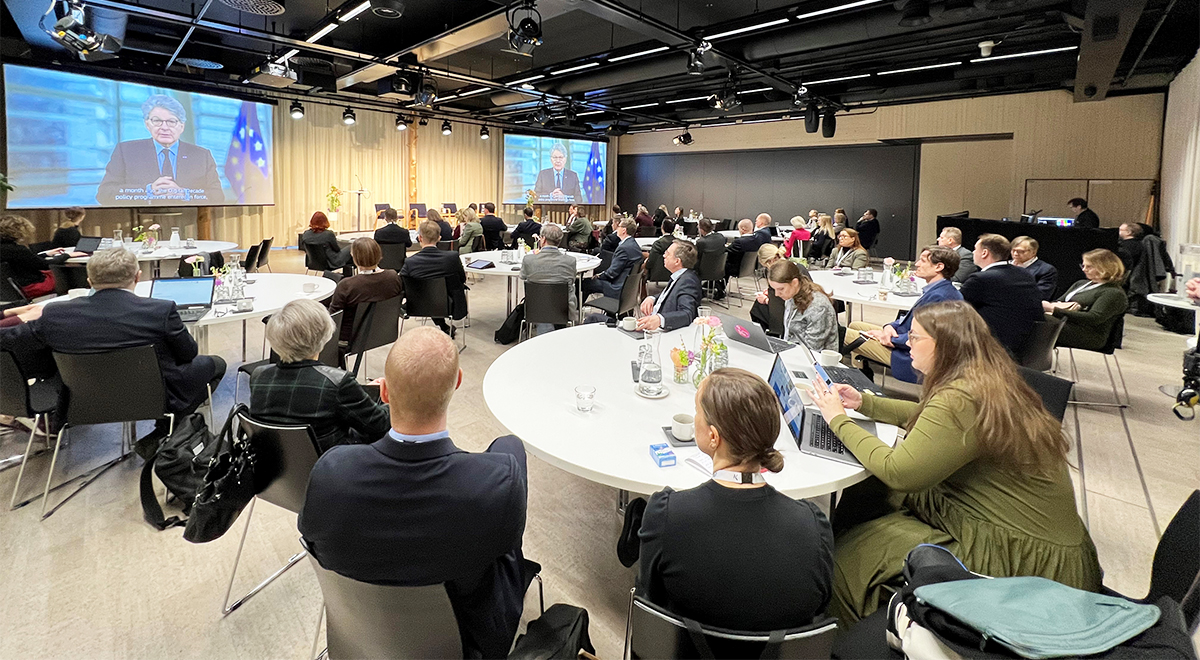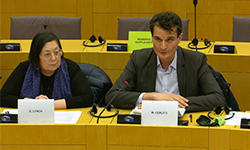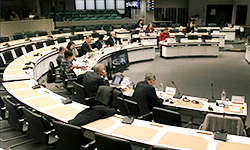BusinessEurope Headlines No. 2023-04
Our SME Roadshow kicked off in Helsinki: are we doing enough for European SMEs?

The first ever SME Roadshow kicked off in Helsinki, Finland, on 8 February. This is the first stop in a series of events across the EU to highlight the role of small and medium-sized enterprises (SMEs) in getting out of the crisis mode in Europe. The event was organised by BusinessEurope together with its member federation, the Confederation of Finnish Industries. Speaking in a panel discussion on sustainability challenges and opportunities, BusinessEurope Entrepreneurship & SME Committee Chair Fabrice Le Saché stressed that “SMEs are currently in difficulties. Companies need regulatory breathing space to survive today’s multiple crises”. He explained that the top priority is to have the SME Test thoroughly applied across all new EU initiatives. “Avoiding unnecessary or disproportionate burdens is key to ensure an SME-proofed regulatory regime. It is therefore all the more valuable to have the European Commissioner for the Internal Market, Thierry Breton, join our first roadshow”, Le Saché highlighted. The event, which attracted more than 200 participants, was a unique opportunity to gather key representatives from across Europe to discuss both challenges and opportunities of SMEs scaling-up in the EU, particularly with regards to the sustainability transition. The conference featured the participation of the Member of the European Parliament Martina Dlabajova, the Undersecretary of State and SME Envoy of Finland Petri Peltonen, and the former Vice-President of the European Commission Jyrki Katainen, as well as CEOs, entrepreneurs, and representatives of business associations, trade unions and NGOs from across Europe.
Contact: Daniele Olivieri
How can EU SMEs remain competitive?
All SMEs share the concern about hyper-regulating and extensive reporting requirements, but the EU can trust that we are already motivated and want to take actions for sustainability - says Dermoshop’s CEO Suvi Markko, who participated in our SME Roadshow in Finland. What do SMEs expect from the EU? Watch what she has to say.
Cost-of-living crisis: avoiding a wage price spiral remains crucial
 Improving Europe’s competitiveness should be at the centre of our response to the current crisis. The impacts of this crisis should be addressed based on its own characteristics, which differ from the COVID crisis. Member States are best placed to deal with the social consequences of the energy crisis. Strictly speaking, there is no evidence of a wage price spiral as of yet. However, with wage growth well above the inflation target there is clearly a strong chance that inflation above 2% becomes entrenched, given present wage increases being likely to be passed on into prices. In this context, responsible collective bargaining between the social partners will be crucial to avoid a wage price spiral going forward. Governments should also make good use of the extra resources that they received through taxes on commodities and other products in the context of high inflation. This means partly to find appropriate ways to target exceptional resources to support people facing higher energy and food prices due to high inflation. But this also means making use of these resources to reduce labour taxes and/or social contributions, which has proven to be an effective way of encouraging job creation by employers. These were the key messages conveyed by Maxime Cerutti, BusinessEurope Director for Social Affairs, at the hearing on “Social and employment consequences of the rising cost of living”, organised by the European Parliament Employment and Social Affairs Committee on 6 February.
Improving Europe’s competitiveness should be at the centre of our response to the current crisis. The impacts of this crisis should be addressed based on its own characteristics, which differ from the COVID crisis. Member States are best placed to deal with the social consequences of the energy crisis. Strictly speaking, there is no evidence of a wage price spiral as of yet. However, with wage growth well above the inflation target there is clearly a strong chance that inflation above 2% becomes entrenched, given present wage increases being likely to be passed on into prices. In this context, responsible collective bargaining between the social partners will be crucial to avoid a wage price spiral going forward. Governments should also make good use of the extra resources that they received through taxes on commodities and other products in the context of high inflation. This means partly to find appropriate ways to target exceptional resources to support people facing higher energy and food prices due to high inflation. But this also means making use of these resources to reduce labour taxes and/or social contributions, which has proven to be an effective way of encouraging job creation by employers. These were the key messages conveyed by Maxime Cerutti, BusinessEurope Director for Social Affairs, at the hearing on “Social and employment consequences of the rising cost of living”, organised by the European Parliament Employment and Social Affairs Committee on 6 February.
Contact: Maxime Cerutti
Future of social protection: employment and productivity growth are key
 Europe is one of the best places to live and work in the world. The EU has been instrumental in making the European way of life what it is today. Economic and social progress go hand in hand. To continue to support our social systems, we need to do better on employment and productivity growth. This is particularly essential in view of the fact that following a decrease by 3.5 million people between 2015 and 2020, the EU working age population is expected to shrink still further over the next years and decades, with the loss of an additional 35 million persons by 2050. In this context, European discussions on social protection should better respect Member States competences over social protection financing. Increasing taxation is no good way forward as this would deteriorate Europe’s competitiveness. The way forward is to focus on improving the efficiency of social investments and spending through concerted policy efforts of the European Commission, Member States and social partners. Following the positive experience of setting up a European network of public employment services some years ago, BusinessEurope recommends to the European Commission and the Swedish Presidency of the Council of the EU to look into the creation of a European network of national social security institutions to provide an EU forum for regular cooperation and benchlearning among the Member States, involving the social partners. These were the main messages expressed by Maxime Cerutti, BusinessEurope Social Affairs Director, during a high-level debate with the European Commissioner for Jobs and Social Rights Nicolas Schmit and the Swedish and Spanish Labour Ministers, amongst others, that took place on 7 February as part of the launch event on the report of the high-level expert group on the future of the welfare state and social protection in Europe.
Europe is one of the best places to live and work in the world. The EU has been instrumental in making the European way of life what it is today. Economic and social progress go hand in hand. To continue to support our social systems, we need to do better on employment and productivity growth. This is particularly essential in view of the fact that following a decrease by 3.5 million people between 2015 and 2020, the EU working age population is expected to shrink still further over the next years and decades, with the loss of an additional 35 million persons by 2050. In this context, European discussions on social protection should better respect Member States competences over social protection financing. Increasing taxation is no good way forward as this would deteriorate Europe’s competitiveness. The way forward is to focus on improving the efficiency of social investments and spending through concerted policy efforts of the European Commission, Member States and social partners. Following the positive experience of setting up a European network of public employment services some years ago, BusinessEurope recommends to the European Commission and the Swedish Presidency of the Council of the EU to look into the creation of a European network of national social security institutions to provide an EU forum for regular cooperation and benchlearning among the Member States, involving the social partners. These were the main messages expressed by Maxime Cerutti, BusinessEurope Social Affairs Director, during a high-level debate with the European Commissioner for Jobs and Social Rights Nicolas Schmit and the Swedish and Spanish Labour Ministers, amongst others, that took place on 7 February as part of the launch event on the report of the high-level expert group on the future of the welfare state and social protection in Europe.
Contact: Anna Kwiatkiewicz
How to improve the functioning of European Works Councils
 Social dialogue at EU, national and company level has an important role in devising arrangements that better reflect the needs of both companies and employees, suited to economic and social change. It enables to build a shared understanding and mutual trust, which are essential prerequisites to modernise European labour markets. In this respect, the recently published European Commission’s social dialogue initiative is a step in the right direction as it will support the development of autonomous social dialogue at EU and national levels. Unfortunately, the European Parliament just did the opposite with its recent report calling for a revision of the 2009 European Works Councils (EWCs) recast directive. Revising the EWCs directive would be counterproductive at a time when we should focus on strengthening the competitiveness of European companies, which are facing unprecedented energy prices and high regulatory costs. The proposed changes in the European Parliament report on EWCs would significantly slowdown decision-making in companies and include unrealistic sanctions. BusinessEurope proposes an alternative approach to a revision of the directive. The Commission could usefully prepare a recommendation and a code of practice to improve the functioning of European Works Councils in a way that respects social partner autonomy. These were the key messages conveyed by Maxime Cerutti, BusinessEurope Director for Social Affairs, at the public hearing ‘’Democracy at work’’, organised by the European Economic and Social Committee on 3 February.
Social dialogue at EU, national and company level has an important role in devising arrangements that better reflect the needs of both companies and employees, suited to economic and social change. It enables to build a shared understanding and mutual trust, which are essential prerequisites to modernise European labour markets. In this respect, the recently published European Commission’s social dialogue initiative is a step in the right direction as it will support the development of autonomous social dialogue at EU and national levels. Unfortunately, the European Parliament just did the opposite with its recent report calling for a revision of the 2009 European Works Councils (EWCs) recast directive. Revising the EWCs directive would be counterproductive at a time when we should focus on strengthening the competitiveness of European companies, which are facing unprecedented energy prices and high regulatory costs. The proposed changes in the European Parliament report on EWCs would significantly slowdown decision-making in companies and include unrealistic sanctions. BusinessEurope proposes an alternative approach to a revision of the directive. The Commission could usefully prepare a recommendation and a code of practice to improve the functioning of European Works Councils in a way that respects social partner autonomy. These were the key messages conveyed by Maxime Cerutti, BusinessEurope Director for Social Affairs, at the public hearing ‘’Democracy at work’’, organised by the European Economic and Social Committee on 3 February.
Contact: Stefan Enica
Calendar 
- 23-24 March: ERA Annual Conference on European Labour Law 2023
- 18 April: VAT in the digital age: digital / real-time reporting - Implications for businesses and compliance processes
- 6 June: Reuters Event: Responsible Business Europe 2023
- 14-15 June: International IP Enforcement Summit
- 19-20 June: TDI23 – Day of Industry
Not yet a subscriber? Register here.
Reminder: please have a look at our privacy policy